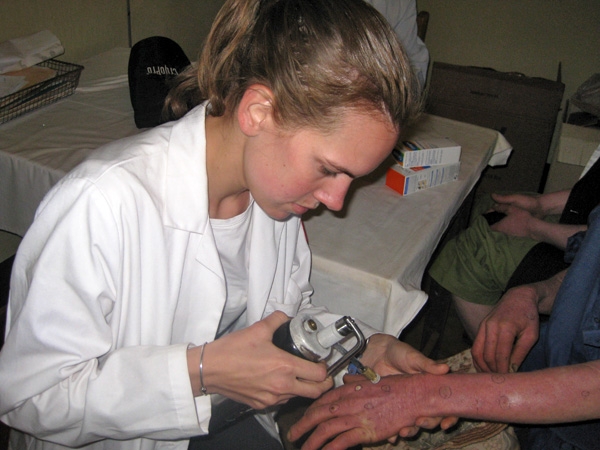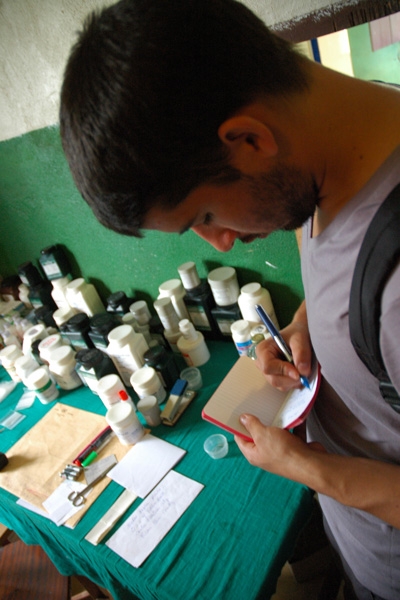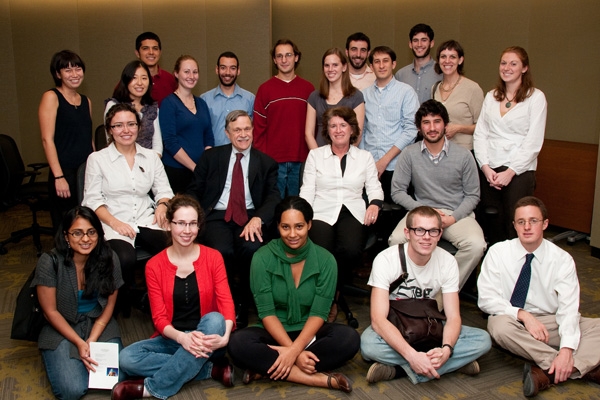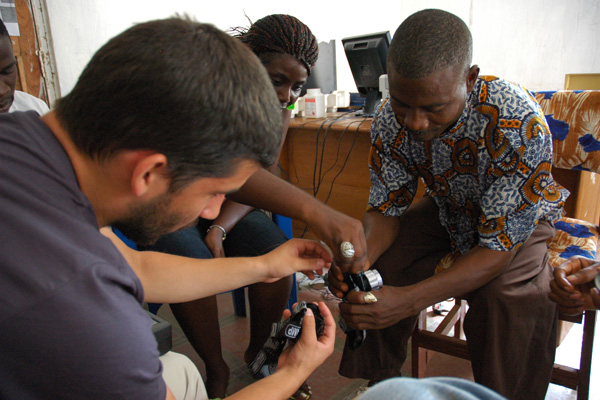
Working at an outreach clinic for albinos in Tanzania, Nora Ward performs cryotherapy to remove solar keratoses.
"In my final cost-benefit analysis," said Carlo Canepa, a second-year student at Weill Cornell Medical College, "the pros of my experience were that I had a ton of responsibility, I was really busy, and I felt really useful, which is not something that I've felt in the past."
Canepa was recounting the eight weeks he spent in Liberia this past summer as an intern at a local clinic. While the summer had its high points — Canepa led a Global Fund visit at his hospital that determined a $5 million dollar budget over 10 years — it was not without its hardships. "There is no safari in Liberia and there is no mountain climbing. There are beaches but you can't swim in them because they are shark-infested."
The occasion was a presentation by second-year Weill Cornell students of the Global Health Projects they did over the summer between their first and second year. Each year, a handful of Weill Cornell students use their last free summer — the following are filled with clinical rotations — to spend two months abroad as an intern under the guidance of a local mentor. Though Canepa's "cost-benefit analysis" elicited a chorus of laughter from the mostly first- and second-year students in the audience, his experience in Liberia — where he primarily taught basic computer skills and database entry — touched on a deeper aspect of Weill Cornell's global health mission.

At the drug depot of Martha Tubman Memorial Hospital, in the town of Zwedru, Liberia, Carlo Canepa takes notes on the availability of drugs.
"Students don't actually come out from the first year with a lot of clinical skills," said Dr. Oliver Fein, associate dean for affiliations at Weill Cornell. "For these projects, that means not necessarily doing clinical work, it means doing the kinds of things that you heard Carlo describing, where you can make a real contribution, and feel useful."
"Each student had difficulties — and also great pleasures — and that's part of the deal," said Dr. Madelon Finkel, professor of clinical public health, and the director of the Office of Global Health Education at Weill Cornell.
The annual presentation of Global Health Projects, which took place this year on Oct. 21 in the Department of Public Health, is an opportunity for second-year students to share their experiences and inspire the next group of students to work abroad, Dr. Finkel said.
Last summer, 21 "Global Health Elective Fellows" traveled to 11 countries across five continents. Their projects spanned a number of medical fields, from infectious diseases and endocrinology, to more specialized areas like pediatric neurology and kidney transplant.

Dr. Oliver Fein and Dr. Madelon Finkel (second row, center) and Global Health Fellows.
In almost all cases, their research projects reflected unique, and pressing, health issues in their host country.
Nora Ward, for example, spent two weeks in Tanzania, a relatively common destination among Weill Cornellians because of the Medical College's strong affiliation with local Tanzanian medical centers. But her research project addressed an entirely unique problem: albinism. In Tanzania, the body parts of albinos are prized by witch doctors as magical, and as a result the country has witnessed a steep increase in murders of albino people over the last two years.
Although Ward did have the chance to climb Mt. Kilimanjaro and go on safari, she also found time to make precisely the kind of hands-on impact that Drs. Fein and Finkel ask of the Weill Cornell Global Health Fellows. She completed a survey to assess the perceptions, goals and safety needs of albinos in Tanzania, and also made direct contributions to the health of the albino population by performing cryotherapy to remove solar keratoses, often the beginning stage of skin cancer.
"It wasn't uncommon to see people who had traveled for hours and hours to get to their appointments," said Ward. "The patients were really appreciative."

Nora Ward with some patients at the albino outreach clinic.

Carlo Canepa leads a training session for community health workers on using solar-powered headlamps for night visits to patients.
